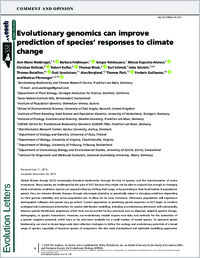Evolutionary genomics can improve prediction of species’ responses to climate change
- Waldvogel, Ann-Marie Senckenberg Biodiversity and Climate Research Centre Frankfurt am Main Germany
- Feldmeyer, Barbara Senckenberg Biodiversity and Climate Research Centre Frankfurt am Main Germany
- Rolshausen, Gregor Senckenberg Biodiversity and Climate Research Centre Frankfurt am Main Germany
- Exposito-Alonso, Moises Department of Plant Biology Carnegie Institution for Science Stanford California
- Rellstab, Christian Swiss Federal Institute WSL Birmensdorf Switzerland
- Kofler, Robert Institute of Population Genetics Vetmeduni Vienna Austria
- Mock, Thomas School of Environmental Sciences University of East Anglia Norwich United Kingdom
- Schmid, Karl Institute of Plant Breeding, Seed Science and Population Genetics University of Hohenheim Stuttgart Germany
- Schmitt, Imke Senckenberg Biodiversity and Climate Research Centre Frankfurt am Main Germany Institute of Ecology, Evolution and Diversity Goethe-University Frankfurt am Main Germany LOEWE Centre for Translational Biodiversity Genomics (LOEWE-TBG) Frankfurt am Main Germany
- Bataillon, Thomas Bioinformatics Research Center Aarhus University Aarhus Denmark
- Savolainen, Outi Department of Ecology and Genetics University of Oulu Finland
- Bergland, Alan Department of Biology University of Virginia Charlottesville Virginia
- Flatt, Thomas Department of Biology University of Fribourg Fribourg Switzerland
- Guillaume, Frederic Department of Evolutionary Biology and Environmental Studies University of Zürich Zürich Switzerland
- Pfenninger, Markus Senckenberg Biodiversity and Climate Research Centre Frankfurt am Main Germany LOEWE Centre for Translational Biodiversity Genomics (LOEWE-TBG) Frankfurt am Main Germany Institute for Organismic and Molecular Evolution Johannes Gutenberg University Mainz Germany
-
14.01.2020
Published in:
- Evolution Letters. - 2020, vol. 4, no. 1, p. 4–18
English
Global climate change (GCC) increasingly threatens biodiversity through the loss of species, and the transformation of entire ecosystems. Many species are challenged by the pace of GCC because they might not be able to respond fast enough to changing biotic and abiotic conditions. Species can respond either by shifting their range, or by persisting in their local habitat. If populations persist, they can tolerate climatic changes through phenotypic plasticity, or genetically adapt to changing conditions depending on their genetic variability and census population size to allow for de novo mutations. Otherwise, populations will experience demographic collapses and species may go extinct. Current approaches to predicting species responses to GCC begin to combine ecological and evolutionary information for species distribution modelling. Including an evolutionary dimension will substantially improve species distribution projections which have not accounted for key processes such as dispersal, adaptive genetic change, demography, or species interactions. However, eco‐evolutionary models require new data and methods for the estimation of a species' adaptive potential, which have so far only been available for a small number of model species. To represent global biodiversity, we need to devise large‐scale data collection strategies to define the ecology and evolutionary potential of a broad range of species, especially of keystone species of ecosystems. We also need standardized and replicable modelling approaches that integrate these new data to account for eco‐ evolutionary processes when predicting the impact of GCC on species' survival. Here, we discuss different genomic approaches that can be used to investigate and predict species responses to GCC. This can serve as guidance for researchers looking for the appropriate experimental setup for their particular system. We furthermore highlight future directions for moving forward in the field and allocating available resources more effectively, to implement mitigation measures before species go extinct and ecosystems lose important functions.
- Faculty
- Faculté des sciences et de médecine
- Department
- Département de Biologie
- Language
-
- English
- Classification
- Biological sciences
- License
- License undefined
- Identifiers
-
- RERO DOC 328164
- DOI 10.1002/evl3.154
- Persistent URL
- https://folia.unifr.ch/unifr/documents/308659
Statistics
Document views: 114
File downloads:
- fla_egi.pdf: 192
